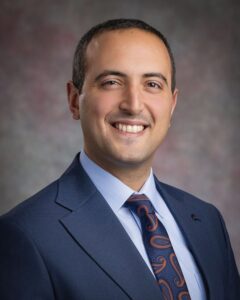Discuss Vacation Plans with a Health Care Provider, Cardiologist Advises
Travel can be an enjoyable experience for those living with heart disease, a ThedaCare heart health expert said.
“The good news is there’s usually no reason to cancel your travel plans,” said Dr. Abdallah Malkawi, a Cardiologist with ThedaCare Cardiovascular Care. “It simply means you’ll need to plan around a few important considerations.”

Dr. Abdallah Malkawi
Those living with heart disease should consider discussing their travel plans with their health care provider, he said.
“Prepare all necessary medications and have your health information available, for example, doctor’s notes for controlled substances or injectables, as well as copies of your prescriptions in case you need a refill,” Dr. Malkawi said. “This can help better ensure you have a safe and smooth travel experience.”
He recommended keeping all medications in their original labeled containers to avoid issues with airport security.
“I suggest not packing your prescription medication in your suitcase. Instead, put them in a carry-on where you can access them,” he said. “In the event of missing luggage, it may be hard to refill medications, depending on your destination.”
Be Mindful of Long Distances
Dr. Malkawi also recommended checking with a health care provider before flying or traveling long distances to confirm that it is safe to do so.
“Travel can be challenging for some people with heart disease,” he said. “Long periods of sitting on a plane or in a car may increase the risk of blood clots, especially for those with a history of heart failure or peripheral artery disease.”
According to the American Heart Association, people who have had recent surgery, are older or have a catheter in a large vein also face a higher risk of clots during travel. A health care provider may recommend compression stockings or supplemental oxygen and may advise skipping alcohol, which may elevate heart rate and blood pressure, Dr. Malkawi said.
“If traveling by plane, help reduce your risk of clots by getting up and walking around whenever it’s possible and safe,” he said. “If you can’t, then flex your feet and rotate your ankles in a circular motion to help improve circulation.”
Prepare for Emergencies
Travelers with heart disease are encouraged to research nearby medical facilities and understand their health insurance coverage before leaving home, Dr. Malkawi said.
Medicare Advantage plans cover emergency and urgent care within the U.S., but other policies may have limitations or high out-of-network costs.
Consider purchasing supplemental travel insurance, often under $200, which can cover medical expenses and emergency transport back to the U.S., Dr. Malkawi said. Carry copies of key medical records and write down important phone numbers, including health care team information.
“Even though most of us have all the information we need at our fingertips, you might forget your phone charger or be traveling in an area where you can’t get a signal to look up the numbers you need,” he said. “Having those with you can help a local health care team get the information they need to best assist you.”
Plan for High Altitudes
Higher altitudes may stress the cardiovascular system, placing people living with heart disease at increased risk for cardiac events while on vacation in such locales.
“Your heart works harder at high altitudes because there’s less oxygen,” Dr. Malkawi said. “If you already have blockages or conditions like angina, those lower oxygen levels may exacerbate your cardiovascular issues.”
People with cardiomyopathy or heart failure, particularly, should consult with their health care provider about how to balance fluid and salt intake at higher altitudes, he said. Higher altitudes may impact the effectiveness or side effects of certain medications, including beta blockers.
“You can take steps to reduce your risk,” Dr. Malkawi said. “Try acclimating gradually. Resting for a while at lower elevations and gradually moving up to higher elevations can help your body adjust to the reduced oxygen levels.”
Stay Cool
Traveling to a warm-weather destination also requires caution.
“Heat exhaustion and heatstroke make your heart work harder,” Dr. Malkawi said. “That can increase the risk of heart attack or other cardiovascular complications.”
Plan ahead by taking breaks in air-conditioned areas and discussing hydration and sodium needs with a health care provider before you head to a hot climate.
“If you have concerns about traveling with heart disease, don’t hesitate to reach out to your cardiovascular care team,” Dr. Malkawi said. “They can recommend steps designed to help you have a safe and smooth vacation.”
Visit https://thedacare.org/services/cardiovascular/ to schedule an appointment with a cardiovascular care provider.

About ThedaCare
For more than 115 years, ThedaCare® has been improving the health and well-being of the communities it serves in northeast and central Wisconsin. The organization delivers care to more than 650,000 residents in 17 counties, and employs approximately 7,000 providers and team members at 180 points of care, including nine hospitals. As an organization committed to being a leader in Population Health, team members are dedicated to empowering people to live their unique, best lives. ThedaCare is a not-for-profit health system with a level II trauma center, comprehensive cancer treatment, stroke and cardiac programs, as well as primary care. ThedaCare also partners with communities to understand needs, find solutions together, and encourage health awareness and action. ThedaCare is part of Froedtert ThedaCare Health, Wisconsin’s most comprehensive health care system.
